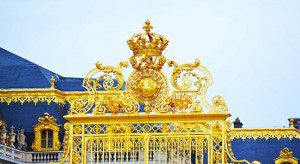I asked some small children this week if they knew what a Kingdom was. It’s surprisingly hard to read through the bible and not bash up against words like ‘king’ and ‘kingdom’ and so the question has to be asked, “What is a king? What is a kingdom?” But the longer I’ve been working with children, the less sense any of them have of what a king might be. If kids have had a steady diet of Disney they might be able to describe a castle. But more often than not I’m met with blank stares.
And how should any of us know what a king is and what he might be like? We don’t have much in the way of pomp and circumstance. We have big light shows at sporting events, we have celebrities, we have the oscars and the tv, but where is the King? And that’s too patriarchal anyhow.
I spent some minutes this week looking at pictures of Donald Trump’s living place–is it in Trump Tower? I hesitate to use the word ‘house’ because that seems like the opposite of whatever this was. Which was gold encrusted. It looked like an eighties dream come true. Liberace and Imelda Marcos and the Kremlin all rolled up together. If any of my little girls had seen it, though, they would have gasped in delight and wonder. Surely a pumpkin shaped carriage is about to roll out of a cupboard.
This muddled modern insensibility to kingship is because we don’t have kings. We worship and revere ourselves without needing to transfer our obeisance to others, unless we indulge in some kind of fan-ship, like for Kim K. Each house is a castle, each man his own master, each woman a mistress, each child lord over all.
When I find Jesus described as King of Kings in the bible, I stand at a distance and have no visual help to make me understand. The kings of the earth are not usually kings any more. They are presidents and tech moguls. They are hidden in banks and mountain caves. They don’t come out so that all the people can bow down. They are persecuted by freedom of the press, except when they live in North Korea in which case they own Twitter. There are no more battle lines, only no fly zones, droning, refuge camps, and Facebook threads. When you’re looking around for a king to blame, eventually you can probably narrow it down to yourself.
No, the very idea of kingship is offensive. Therefore, it sets up the stark reality of Advent very nicely. The twisted, consumer craze of America’s secular “Christmas” where Santa sits upon a velvet throne and we all get our hearts desire is entirely contrary (though most of us thoughtfully and lovingly join them together) to the catastrophic entrance of the King into his own Kingdom. Jesus toddling around on the dust of the earth, growing up to calm the storm, subvert his enemy, and die for the girl is not what everybody wanted. The fact that I sit up eagerly in my pew, wondering and marveling about his return, the power of his word, the grace of his warhorse makes me treacherous to the kings of this age.
“What will it be like,” I ask my Sunday school kids, “when everyone sees Jesus for who he is? When he comes back and the whole world bows before him?” Nobody really knows. We try to imagine, to wonder, to push aside the tawdry gold encrusted loyalties of this earth and imagine one so great, so true, so just that no one argues any more when he arrives on the scene. Everyone falls back and knows and sees his greatness and his goodness.
Until then the interplay of light and dark, of mercy and cruelty, of lying and the truth make us battle together, enthroning one and then another, ourselves most of all, as supreme over the world.












